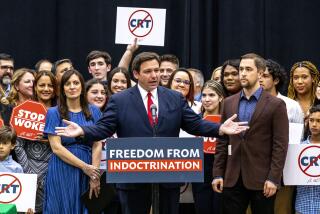The Pledge Issue Is No Joke; It’s Classic Divide and Conquer
Vice President George Bush has decided to make Democratic presidential candidate Michael S. Dukakis’ stand on a state law concerning the Pledge of Allegiance a major issue in the 1988 political campaign. “What is it about the Pledge of Allegiance that upsets him so much?” Bush regularly asks in his stump speech, implying that perhaps Dukakis’ allegiance itself is suspect.
In 1977 Dukakis vetoed a bill requiring teachers to lead students in the recitation of the pledge in public schools because the Massachusetts Supreme Court advised him that it was unconstitutional. But questions of constitutional law have nothing to do with the raw emotions that the Republicans are trying to tap when they begin every campaign event in the same way in which Bush ended his acceptance speech in New Orleans--by saying the Pledge of Allegiance.
The pledge is fast becoming the Republicans’ favorite issue. Attacking the patriotism of Democrats may not be a high-minded strategy, but there is an electoral logic behind it. Bush is trying to retain the loyalty of the “Reagan Democrats”--blue-collar voters who cast their ballots for Ronald Reagan in 1980 and 1984. To keep them from returning to the Democratic fold, the vice president has been pushing their “hot buttons”--issues that Bush’s pollsters have identified as provoking an emotional reaction from voters.
Two of the big issues are crime and patriotism. Convicted murderer Willie Horton, who escaped from a Massachusetts prison while on furlough, has already become the most famous felon in America, courtesy of the Republican Party, which offers him as proof that Dukakis is soft on crime. The pledge issue is supposed to prove that Dukakis is soft on communism.
The attack on Dukakis’ patriotism also meshes neatly with Bush aide Lee Atwater’s belief in the efficacy of negative campaigning. Bush began the campaign with some of the highest negative ratings ever seen. Atwater’s strategy has been to even up the bad impressions that voters have of the two candidates.
But, ironically, it was the debacle of Indiana Sen. Dan Quayle that triggeredthe escalated attacks on Dukakis’ patriotism. Quayle’s hawkish record on defense was one reason that Bush picked him to be his running mate; then the revelations concerning Quayle’s military record suggested that the superhawk was a sunshine patriot.
Searching frantically for ways to control the damage, the Bush campaign tried turning the tables on the inquisitors, impugning the patriotism of the media. Misdirection, as every magician’s apprentice knows, is the essence of any good illusion. By questioning Quayle, the campaign argued, journalists were maligning the honor of the National Guard. And some of these same hypocritical journalists, Sen. Alan Simpson (R-Wyo.) charged, had carried Viet Cong flags or fled to Canada to avoid the draft.
The polls suggested that this ploy worked, so Bush himself picked up the theme. Defending Quayle to the Veterans of Foreign Wars, Bush contrasted his running mate’s honorable service with the dubious loyalty of unnamed others. “He did not go to Canada, he did not burn his draft card, and he damn sure didn’t burn the American flag!” Bush said with unusual emotion. Shortly thereafter, Bush began hitting the Pledge of Allegiance issue at every campaign stop.
Dukakis’ inexperience in foreign affairs makes this a fair and obvious point of attack for Republicans. But it is one thing to argue that a candidate’s policies are so wrongheaded that they endanger the national interest; it is quite another to imply that the candidate may not have the national interest at heart. Hyperbole is an integral part of political campaigns, but there is a line, however fine, between hyperbole and demagoguery.
Among the political cognoscenti, Bush’s attack on Dukakis over the pledge has become something of a joke because it is obviously so shallow. It ought to be taken more seriously. Bush will not say it openly, but he is sending the message that the Democrats and their standard-bearer are disloyal. If it was not having a significant effect on the electorate, the Bush campaign would not keep doing it.
Such rancorous rhetoric is not just the effluvia of a heated campaign. Attacking the loyalty of Democrats has become the standard screed on the Republican right. Congressmen like Newt Gingrich, Robert Walker and Henry Hyde have made Congress’ perennial debates about Nicaragua the most bitter and malicious of the decade.
This paranoid style has a long history in American politics. When the questioningof peoples’ patriotism for political gain reached its zenith in the 1950s, senior Republicans stood silent because the dirty work helped break down the Democrats’ majority New Deal coalition.
Having just donned the mantle of Republican leader, Bush is now appealing to atavistic instincts in hopes of preventing the Democrats from putting a majority coalition back together. When future historians write about the demagoguery of the 1988 presidential campaign and the scoundrels responsible for it, they won’t ask, “Where was George?” He was rightin the thick of it.
More to Read
Get the L.A. Times Politics newsletter
Deeply reported insights into legislation, politics and policy from Sacramento, Washington and beyond. In your inbox three times per week.
You may occasionally receive promotional content from the Los Angeles Times.










